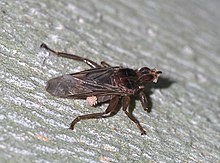
Back معايشة Arabic Kommensalizm Azerbaijani Каменсалізм Byelorussian Камэнсалізм BE-X-OLD Коменсализъм Bulgarian Komensalizam BS Comensalisme Catalan Komenzálismus Czech Kommensalisme Danish Kommensalismus German

Commensalism is a type of relationship between two organisms. In commensalism, one organism is helped while the other is not affected. In practice, it is difficult to show that the passive organism is not harmed. For example, some birds live in holes in trees. Does this damage the tree? Mites, which cannot fly, often hitch a ride on insects. Does this affect the insect's fitness? There is no definite answer to such questions.
Orchids, mosses, and lichens all grow on tropical trees. They need sunlight, and by being higher up they get to the sunlight. All that can be said for sure is that the trees continue to live and reproduce, and so it is assumed that these epiphytes do not affect their host plant.
Pierre-Joseph van Beneden (1809–1894) introduced the term into evolutionary biology and ecology in the 1870s.[1]
- ↑ Boucher D.H. 1985. The idea of mutualism, past and future. In D.H. Boucher (ed) The biology of mutualism: ecology and evolution. Oxford University Press. 1–28